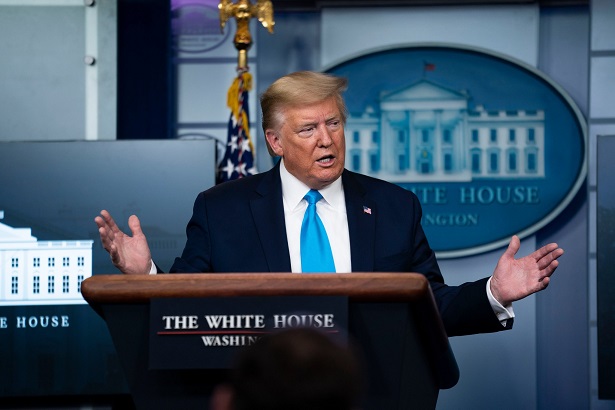WASHINGTON — President Trump lashed out on Tuesday at the World Health Organization, choosing a new political enemy to attack and threatening to withhold funding from a premier health institution even as a deadly virus ravages nations around the globe.
“We’re going to put a hold on money spent to the W.H.O. We’re going to put a very powerful hold on it and we’re going to see,” Mr. Trump said during the daily coronavirus briefing at the White House, accusing the organization of having not been aggressive enough in confronting the virus. “They called it wrong. They call it wrong. They really, they missed the call.”
In effect, Mr. Trump sought to denounce the W.H.O. for the very missteps and failures that have been leveled at him and his administration. Public health experts have said the president’s public denials of the virus’s dangers slowed the American response, which included delayed testing and a failure to stockpile protective gear.
In fact, the W.H.O. sounded the alarm in the earliest days of the crisis, declaring a “public health emergency of international concern” a day before the United States secretary of health and human services announced the country’s own public health emergency and weeks before Mr. Trump declared a national emergency.
“I’m not saying that I’m going to do it. But we’re going to look at it,” he said. When a reporter noted that he had indeed said the funding would end, Mr. Trump insisted, wrongly: “No, I didn’t. I said we’re going to look at it.”
In fact, the W.H.O. repeatedly issued warnings about the emergence of the virus in China and its spread across the world.
“That’s a nice way of saying it, but they seem to be very China-centric,” the president said. “They seem to err always on the side of China. And we fund it. So I want to look into it.”
The budget for the W.H.O. is about $6 billion, which comes from member countries around the world. In 2019, the last year for which figures were available, the United States contributed about $553 million.
It was unclear whether Mr. Trump planned to eliminate all of the money that the United States sends to the organization, but he said that “we’re going to look at it.” He added that his government would investigate the W.H.O., saying that “we will look at ending funding.”
Mr. Trump appeared to relish having a new target to blame for the pandemic that has plunged the world — and the United States — into deep economic distress and forced people to abandon their jobs, close schools and stay in their homes to curb the virus’s spread.
The president sometimes issues threats on which he later does not follow through. But if his administration does withdraw all of its funding to the W.H.O. — which accounts for about 10 percent of the group’s budget — it could significantly affect its mission.
Founded in 1948, the W.H.O. has its headquarters in Geneva but has 7,000 workers in 150 offices around the world. Its website says that it works to promote primary health care around the world, improve access to essential medicine and help train health care workers.
Earlier Tuesday, the largest bloc of member states at the United Nations delivered a veiled but pointed criticism of the United States over the international response to the coronavirus pandemic, denouncing the use of economic sanctions during the crisis and rejecting any “stigmatization or discrimination” in the battle to defeat the deadly scourge. The United States has resisted pressure from other member states to rescind economic sanctions against Iran, which is among the countries hardest hit by the virus.
Mr. Trump’s accusations against the W.H.O. follow similar criticism from Republican lawmakers who have appeared on Fox News in recent days.
Those lawmakers have accused the organization of failing to question China’s reports on the spread of the coronavirus. Multiple senators have appeared on Fox News, the president’s favored network, to charge that the organization should bear the blame for not curtailing the virus.
“If they had done their job, everybody would have gotten more ready,” Senator Rick Scott, Republican of Florida, said in an interview with the network Monday night. “We wouldn’t have shut down this economy, and we wouldn’t have all these people dead all over the world.”
Mr. Scott, who sits on the Senate Homeland Security Committee, said that he had spoken with Senator Ron Johnson, Republican of Wisconsin and the chairman of the committee, and that Mr. Johnson had agreed to investigate the W.H.O.’s response. On Tuesday, Senator Jim Risch, Republican of Idaho and the chairman of the Senate Foreign Relations Committee, also called for an independent inquiry into how the group handled the response.
Senator Martha McSally, Republican of Arizona, has called on the director general of the W.H.O. to step down. And a group of Republican senators sent a letter to the group in January, demanding that Taiwan, which is not a member of the organization, be included in emergency briefings about the virus.
“Very much needed,” Senator Ted Cruz, Republican of Texas, said in response to Mr. Trump’s tweet Tuesday morning. “The W.H.O. has been far too willing to parrot Chinese propaganda.”
———————————————————————————–
Emily Cochrane contributed reporting from Washington, and Rick Gladstone from New York.
